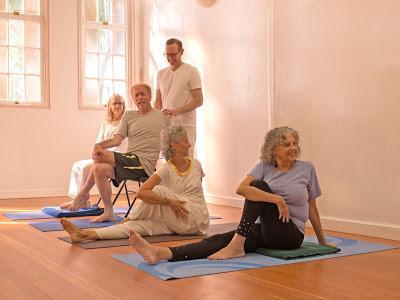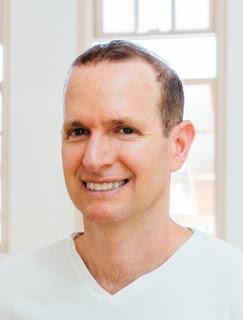
Jivana teaching Accessible Yoga, photographed by Sarit Z Rogers
The recent death of beloved yoga teacher and writer Michael Stone has been haunting me. I think there are some important lessons in his personal struggle that we need to learn from as a yoga community. Even though he was teaching the world how to deal with the pain of our human existence, he was personally dealing with bipolar disorder, which he had not publicly discussed.I have no problem with yoga teachers keeping their personal problems to themselves, because that's what healthy boundaries are. We are there to serve our students and not just talk about our own issues, especially if they're unresolved. For myself, it is a constant struggle to find a balance between over-sharing and being authentic in my teaching. What I'm concerned about is the idea that as a yoga teacher we have to achieve some kind of perfection in our own lives and that our faults somehow reduce our capacity to teach. In fact, I think it's the other way around: our personal challenges make us more effective teachers because we are forced to apply the teachings in our own lives.
Accessible Yoga, the organization I founded, is dedicated to changing the consciousness around who can practice yoga and who can consider themselves a yogi. If, as yoga teachers, we try to force ourselves into a perfect mold, only sharing the attractive parts, only demonstrating the poses we’re good at, then we're digging a hole for our students. If we can show our students that we are also struggling, and if we can be honest about our own path, then I think we have the opportunity to lift our students up with us. In fact, we lift the whole yoga community any time we speak honestly and with integrity.
Unfortunately, these days we see that aspirational marketing seems to work really well. We look at the covers of yoga magazines and that somehow inspires us to want a perfect body and a perfect life (as if that actually exists!). So when yoga teachers neglect to share their truth, they contribute to a communal delusion that yoga is for some and not for all.
Personally, my interest in spirituality began when I was about eleven years old and I realized I was gay. I felt divorced from the "normal" life I saw around me. It was a horrible feeling, and I was miserable for many years. Ironically, that feeling of being an outsider is at the core of the spiritual teachings. The ability to be the witness and stand apart from our ego and connect to a deeper place within us is what yoga is all about.
It took many years for me to except that I was gay, and even longer to acknowledge the beauty of being different and of being the outsider. Then in the late 80s I was surrounded by friends dying of AIDS and it was devastating. Only by confronting that pain was I able to do something positive in response, and that was to bring yoga to the HIV/AIDS community in San Francisco. Those early classes are what led me to begin sharing yoga with people with disabilities and that's what eventually grew into Accessible Yoga.
The truth is no one deserves the yoga teachings more than anybody else. These teachings, like all spiritual understanding, are universal truths that belong to everyone regardless of ability or background. As yoga teachers, it is our job to find ways to make these teachings accessible and universal. If we control and limit them, we are exposing a limitation in our own understanding.
Most of us are striving for equality in our communities, both socially and economically. But if we don't have equality in spiritual teachings then we're really in trouble. Let's take our yoga teachers down off of their pedestals, and give them a chance to be human with all their weaknesses and all their problems. In our shared humanity and suffering, we can join hands and support each other to dive deep inside where all yoga teachings take us—to a place where we are all perfect and free. Thank you, Michael Stone, for continuing to teach us, even in your death.

Subscribe to Yoga for Healthy Aging by Email ° Follow Yoga for Healthy Aging on Facebook ° Join this site with Google Friend Connect

